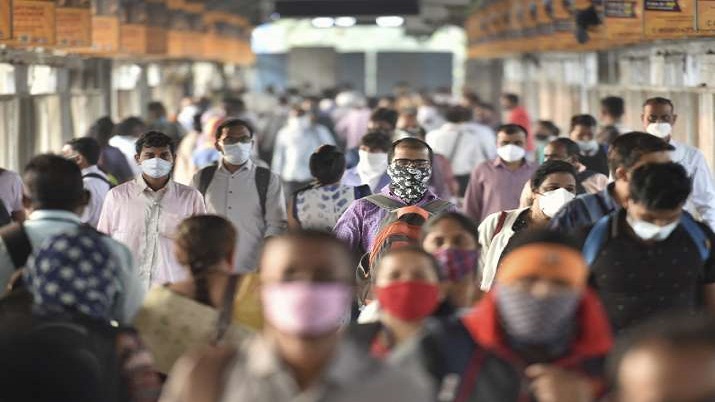
Experts say many people now have immunity against COVID-19, but protection is no less
Experts said that a large number of people now have immunity to the coronavirus due to previous infection or vaccination, but to avoid a crisis like a second wave, a protected approach is needed in the context of implementing restrictive measures. Dr Yudhveer Singh, who is managing the COVID-19 ICU at AIIMS New Delhi, said that it is important to remove some restrictions to resume economic activities when the cases are low.
“However, one should not let one’s guard down… take a guarded approach in terms of following COVID-19-appropriate behavior and implementing restrictive measures,” he said.
Singh said Delhi has already achieved herd immunity in view of the large number of cases during the second wave.
However, Dr Pooja Khosla, Senior Consultant (Medical Department), Sir Ganga Ram Hospital, said that the second wave of coronavirus has taught us that the cases can rise suddenly.
“There are warning signs from different parts of the world. In India too, there has been a slight increase in cases. Infections can rise exponentially at any point of time. I guess nobody believes anything. should and all efforts should be made to prevent a crisis like second wave, which was a nightmare,” he said.
“It is not fair to open everything…everyone is saying that the third wave is a few days away,” Dr Khosla said.
Pragya Sharma, Professor (Department of Community Medicine) at Maulana Azad Medical College said that the third wave is a sure thing, but how many people will be infected by it will depend on the implementation of preventive measures and the pace of vaccination.
“Even if there were breakthrough infections among those who were vaccinated, the severity would be low and hospitals would not be overwhelmed,” she said.
Sharma thinks that implementation of preventive and preventive measures is an issue.
He said, “People either do not wear masks or do not wear them properly. Most of them use cloth masks, which serves no purpose. There is hardly any vigilance in crowded areas. Doing.”
After the devastating second wave of the coronavirus, people started taking vaccination seriously. There will be queues at vaccination centres, but things have changed again. There is laxity on the part of the people, Dr Sharma said.
“At the vaccination center in MAMC, only 50 people are being vaccinated in a day, whereas we can vaccinate around 200 people every day. Vaccines are available but people are not coming forward,” he said.
Dr Jugal Kishor, head of the community medicine department of Safdarjung Hospital, said that around 80 per cent of people have immunity to the virus, either due to previous infection or due to vaccination.
“The delta variant of the coronavirus was responsible for 60 per cent of the cases during the second wave. We have not seen any major difference between the ‘delta’ and the ‘delta plus’ variant. Therefore, a sudden spike in COVID-19 cases is not expected, until a new, more infectious form emerges,” he said.
Nevertheless, there is a percentage of people who have not been infected or developed enough antibodies despite vaccination for various reasons. This group of people, which constitutes about 30 per cent of the population in Delhi, is likely to be infected.
“Two cases are possible – first, the virus continues to slowly infect people until hearing immunity is acquired, and second, cases increase until a new, more infectious form is immune to all. But it seems that the third wave is as severe as the second,” he said.
With the lifting of the restrictions, people from rural areas have started coming to Delhi or those who have been isolated so far, are moving out. “If such people go to crowded places, there is a possibility of a spurt in cases,” he said.
There is also a possibility that a new variant bypasses immunity acquired through vaccination and previous infection. If that happens, it will be a huge problem, Dr Kishor said.
NITI Aayog member Dr VK Paul has also asked the Delhi government to be vigilant as the next three months are crucial and unlocked activities may lead to a rise in COVID-19 cases.
However, the third wave of COVID-19 is “not likely to be as severe as the second wave”, Dr Samiran Panda of the Indian Council of Medical Research had told the Delhi Disaster Management Authority during a meeting on July 9.
He had mentioned that a substantial third wave would be plausible if a new, more contagious form of coronavirus emerges and evades prior immunity in the absence of adequate lockdown measures.
Dr Panda suggested that vaccination efforts should be intensified to strongly reduce the impact of a potential third wave.
Delhi battled a brutal second wave of the pandemic with oxygen shortages in hospitals across the city claiming a large number of lives.
On April 20, Delhi had reported 28,395 cases, the highest in the city since the start of the pandemic. The case positivity rate on April 22 was 36.2 percent, which is the highest ever.
The highest number of 448 deaths occurred on 3 May.
The capital has recorded 2,369 cases of coronavirus in the last 30 days (since June 24), an average of 79 cases in a day.
Read also | 39,742 new COVID cases, 535 deaths reported in India in last 24 hours; Active cases now 4,08,212
Read also | COVID: 66 new cases registered in Delhi, 2 deaths
.